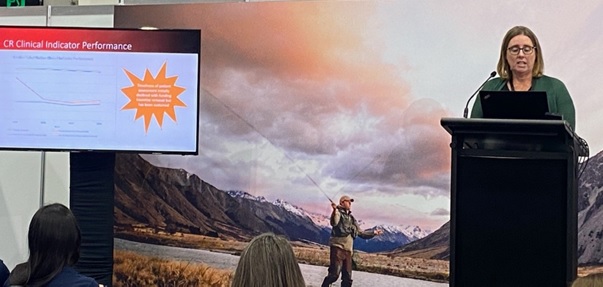The Queensland Cardiac Quality and Informatics Program (QCQuIP) featured prominently on the national stage recently at the Australian Cardiac Rehabilitation Association (ACRA) Scientific Conference and the Cardiac Society of Australia and New Zealand (CSANZ) Scientific Meeting.
The QCQuIP model, which includes the Queensland Cardiac Outcomes Registry (QCOR), was the subject of these meetings and its successful approach to using data to improve health outcomes has also earnt a place in the national scientific journal, Heart, Lung and Circulation.
An initiative of the Queensland Cardiac Clinical Network (QCCN), QCQuIP not only informs and facilitates quality and safety standards in the field of cardiac healthcare, but it also provides the basis for a raft of research and improvement outcomes. Some of these outputs were in the spotlight recently, along with the QCQuIP model itself. A sample of the local and national work that featured at these conferences and supported by QCQuIP and QCOR is listed below.
One such achiever is Samara Phillips, Statewide Cardiac Rehabilitation Programs Manager from Metro South Hospital and Health Service, who presented two posters at the ACRA and CSANZ conferences. Her Management and rehabilitation post median sternotomy in Queensland poster won the ‘People’s Choice Award for Best Poster, which was lauded as a world-leading initiative.
Samara also gave an oral presentation in the ACRA Clinical Prize Session entitled; Implementation of a system-wide, data-driven, web-based tool to improve cardiac rehabilitation in Queensland. The presentation outlined the process and outcomes of the QCQuIP and QCOR point of care patient management, data capture, reporting and quality improvement program. She said it generated a great deal of interest. “Interstate counterparts were particularly interested as they are seeking to replicate its success in engaging stakeholders and translating administrative and point of care information into improve clinical care and outcomes,” she said.
QCOR is already working with the National Health and Medical Research Council group SOLVE-CHD who are attempting to standardise data collection nationally and implement common quality indicators - work Queensland has been doing since 2017. “It is pleasing to see the breadth and quality of research and improvement activities of our clinical and non-clinical community being shared,” William Vollbon, Manager QCQuIP, said.
William said QCOR challenged the traditional model of a clinical registry by leveraging point of care clinical information embedded in clinical workflows, to collect data in real-time. “This is paired with numerous other existing data sources including clinical and administrative systems and other agencies, such as Queensland Ambulance Service,” he said. “This information is used to produce not only meaningful clinical documentation that forms part of the patient’s medical record but also provides the basis for a comprehensive, clinical quality and safety improvement program.”
“The QCQuIP enjoys 100 per cent participation from relevant clinical service lines, making it the largest and most comprehensive clinical registry and quality program of its kind in Australia,” William said.
“We are traditionally quiet achievers, so it is humbling and validating to see the approach and outcomes acclaimed by National audiences.”

Samara Phillips, Qld Cardiac Rehabilitation Manager presenting QCQuIP and QCOR at the Cardiac Society of Australia and New Zealand (CSANZ)
The following QCOR-supported investigations were also presented by Queensland Health staff at the 2022 CSANZ and ACRA Scientific meetings:
- Sex Differences in Time to Reperfusion and Mortality in ST-Segment Elevation Myocardial Infarction (STEMI): Insights From the Queensland Cardiac Outcomes Registry (QCOR). M. Savage, D. Murdoch, I. Ranasinghe and O. Raffel
- Use of Cluster Analysis to Characterise Aortic Stenosis Phenotypes with Treatable and Untreatable Risk. J. Sen, D. Pires, A. de Sá, D. Ascher, S. Wahi and T. Marwick
- Implementation of a System-Wide, Data-Driven Approach to Improving Cardiac Rehabilitation in Queensland. S. Phillips, W. Vollbon and K. Kidby
- Management and Rehabilitation Post Median Sternotomy in Queensland. S. Phillips, A. Mahoney, J. Adsett and D. El-Ansary
- Five-Year Outcomes of a Structural Heart Program in a Regional Hospital Without On-Site Cardiac Surgical Support. G. Aprile, A. Dermedgoglou, P. Powaloski, S. Nguyen, A. Brazzale and G. Starmer
- Outcomes of Rotational Atherectomy in Three Large Queensland Centres Without Onsite Cardiac Surgical Backup in a Contemporary Patient Cohort – A 9-Year Experience; G. Malhotra and P. Stewart
- Reasons for non-attendance in a population group that would benefit most. S. Phillips, Statewide Cardiac Clinical Informatics Unit /QCIQP